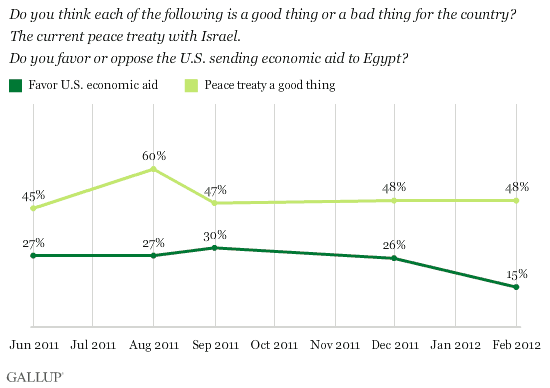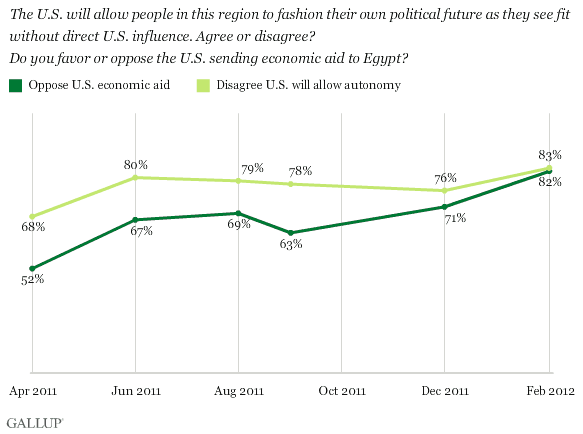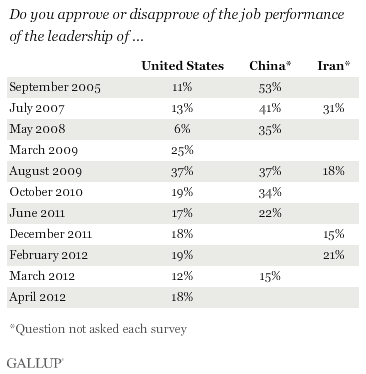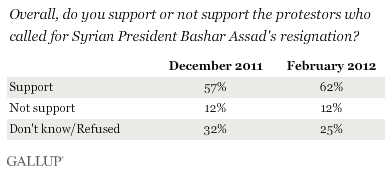This article is part of a series of U.S. Foreign Policy Opinion Briefings aimed at helping to inform U.S. leaders on pressing foreign policy issues.
Quick Summary: President Mohamed Morsi, Egypt's first freely elected head of state, visits the U.S. for the first time next week amid growing tensions between the two countries. Though Egyptian approval of U.S. leadership has been fairly steady since 2010, with fewer than one in five expressing positive views, Egyptians' views of American intentions worsened over the past year. They increasingly oppose U.S. economic aid and see the U.S. as interfering in their internal affairs. Egyptians are far more likely, however, to oppose U.S. aid (82%) than they are to reject the peace treaty with Israel (42%) that started the flow of U.S. assistance to Egypt. And several other powers do not fare much better. Egyptians' opinions of Iranian and Chinese leaders mirror their views of the U.S., and most Egyptians side with Syrian rebels fighting to overthrow Bashar Al Assad -- Iran's closest regional ally.
Issue at Hand: Once considered a "stable" U.S. ally, Egypt's ongoing rocky transition to democracy after popular protests ousted former President Hosni Mubarak has tested the bilateral relationship. Most recently, protesters angry at a YouTube video seen as denigrating the prophet of Islam scaled the walls of the U.S. embassy in Cairo and tore down the U.S. flag. Demonstrations continued for several days resulting in several deaths and hundreds of arrests.
Some Western observers saw Morsi's eventual condemnation of the events as too little too late. Many fear that Morsi, an Islamist affiliated with the Muslim Brotherhood, will turn Egypt's foreign policy away from U.S. interests, threaten Middle East peace, and foster closer relations with countries with competing interests in the region, such as Iran and China.
The most populous Arab country and the first to sign a peace treaty with Israel, Egypt has played an important role in U.S. Middle East policy for more than three decades and many analysts consider it an anchor for regional stability and security. The U.S. provides Egypt with $2 billion a year in aid, mostly to its military, as well as some trade benefits and security cooperation meant to support the peace accord and strengthen bilateral relations. Previous Republican and Democratic administrations considered Mubarak an ally before popular protests ousted him in February 2011.
The Obama Administration's Stance: President Barack Obama made headlines last week when he said in an interview that Egypt was not an ally or an enemy, signaling a possible chilling of relations between the two nations. In response to recent events, a Republican-controlled House of Representatives has stalled U.S. aid to Israel's largest Arab neighbor, as well as its promised $1 billion debt forgiveness.
Despite these challenges, the Obama administration continues to consider Egypt a strategic partner for Middle East peace and security cooperation and its regional influence is vital to U.S. interests. Obama backed protesters calling for Mubarak's ouster, and the administration has praised Egypt's election process and continues to support the country's transition to civil democratic rule.
Egyptians Twice as Likely to Oppose U.S. Aid as Peace With Israel: Egyptians are roughly split on whether Egypt's peace treaty with Israel is a good thing or a bad thing for their country. But they oppose (82%) the U.S. economic aid to their country that the historical peace accord paved the way for. Egyptian rejection of American aid has grown steadily over the transition period from 40% favoring assistance and 52% opposing it in April 2011 to 15% favoring the package and 82% opposing it a year later.
In an attempt to regain influence with Egypt's new government, some members of Congress have threatened to cut U.S. aid to the long-time recipient. Regardless of whether the Egyptian government sees this as a realistic possibility, with popular sentiment so strongly against American assistance, Egypt's leaders will likely feel little political pressure to make concessions in response.
Additionally, it does not appear that U.S. assistance is shoring up popular support for Egypt's tense peace with Israel. Egyptians are far more likely to see the Camp David accord as good for their country (48%) than bad (42%) as to favor U.S. aid (15%) than to oppose it (82%).

Egyptians Fear American Interference: Egyptians may resent U.S. aid for the same reason some members of Congress are calling it into question -- it is seen as a tool of U.S. influence with Egypt's government. Most Egyptians (83%) believe the U.S. will not allow people in their region to fashion their own political future as they see fit. This compares with 68% who held this view in April 2011.

Iran, China No More Popular in Egypt Than U.S.: Fewer than one in five Egyptians say they approve of the leadership of the U.S., holding relatively steady since March 2010 after an initial surge in approval (37%) following Obama's Cairo address. This compares with 6% at the end of the Bush administration. While some have feared the first elected president of Egypt will bow to populism and turn Egypt's foreign policy away from the U.S. to China and Iran, Egyptian popular sentiment toward these countries reveals another story. China's image in Egypt has deteriorated from more than 50% of Egyptians expressing confidence in China's leadership in 2005 to 15% saying the same in 2012.
Iranian leaders' attempt to claim Egypt's uprising as a diplomatic victory over the West has not won them many friends in a country where the majority support Syrian rebels fighting to overthrow Bashar Al Assad, Iran's closest Arab ally. One year after the overthrow of Mubarak, Egyptians were as likely to approve of Iran's leadership (21%) as the U.S.' (19%).

Obama Administration, Egyptians Agree on Syria: Syria is one issue many Egyptians and U.S. policymakers are aligned on. This presents a serious obstacle to closer relations between Egypt and Iran since Tehran has backed Syria's embattled ruler and an opening for cooperation between Egypt and the U.S. Egyptians are roughly five times more likely to support the Syrian opposition (62%) than to oppose those fighting to end Assad's rule (12%).

Policy Implications: Egypt continues to be an influential regional power whose stability is vital to regional security. The next administration will therefore have to engage Egypt constructively. Because the soon-to-be decided U.S. president will negotiate with a country with an increasingly assertive public will, the U.S. must tread lightly, conscious of its perceived heavy hand. The next administration will need to make a case for its proposals from the perspective of both American and Egyptian interests, as will the Egyptian government.
American policymakers may need to revisit old tools of "leverage" such as aid, while expanding U.S. outreach to include exchanges that may be more meaningful to the receiving public. Egyptians' relatively higher support for their country's peace treaty with Israel compared with American aid suggests that securing their future acceptance of the treaty depends on demonstrating how it benefits Egyptian interests outside of the assistance package.
Egyptian and American leaders should focus on areas of common interests such as growing Egypt's economy, vitalizing its private sector, and securing its borders from violent extremists. Agreement on Syria may also present an opening for regional cooperation and a counter weight to the perception that America is not committed to Arab self-determination.
For complete data sets or custom research from the more than 150 countries Gallup continually surveys, please contact us.
Survey Methods
Results are based on face-to-face interviews with 1,000 adults, aged 15 and older per wave, conducted April 1, 2011-April 1, 2012, in Egypt. For results based on the total sample of national adults, one can say with 95% confidence that the maximum margin of sampling error is ±3 percentage points. The margin of error reflects the influence of data weighting. In addition to sampling error, question wording and practical difficulties in conducting surveys can introduce error or bias into the findings of public opinion polls.
For more complete methodology and specific survey dates, please review Gallup's Country Data Set details.
